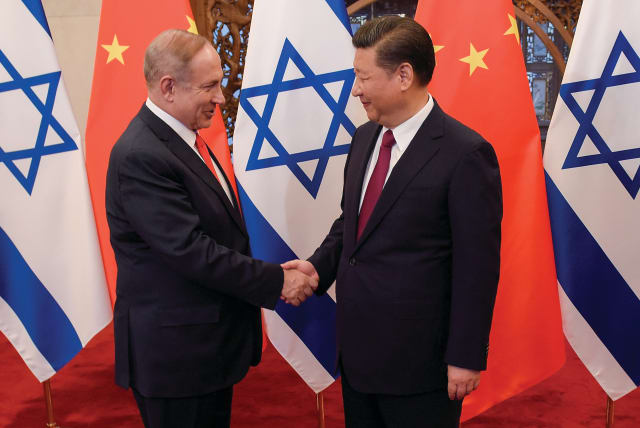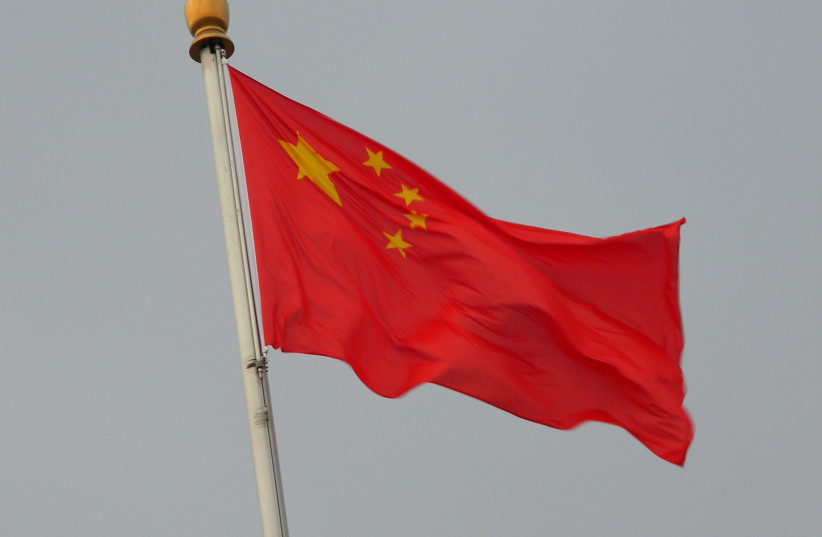What is the new Israeli government’s China policy? - opinion

The new Israeli government should promote economic relations with China subject to considerations of national security and promoting the strategic dialogue with Washington on technology.
Against the background of global strategic competition, the 37th Israeli government must wisely navigate between the great powers. Prime Minister Benjamin Netanyahu, who has enthusiastically led the development of Israel’s relations with China in the past decade, must decide on Israel’s future path between China and the United States, and between the economy and national security.
Since the start of the last decade, Israeli governments have conducted a clear policy of promoting economic relations with China in the fields of innovation, investment, projects and trade. Netanyahu, the architect of these relations, identified China’s growing economy as an important opportunity for Israel, defining the start-up nation’s innovation as an excellent match for China’s technological needs, capital and markets as a marriage made in heaven.
In his new memoir, Netanyahu describes the policy. He says that like most Western leaders, he walked a tightrope in Israel’s relations with China. On the one hand, the goal was to open the vast Chinese market to Israeli investors and at the same time, establish Chinese investments in Israel, particularly in public infrastructure.
On the other hand, he was candid with the Chinese about restrictions on military and intelligence technologies that Israel could not share with Chinese companies. That was an iron-clad commitment to the US, Israel’s big ally, with whom it shares many of these technologies, as well as the values of freedom and democracy. Indeed, Israel’s policy on its relations with China in this period can be described as the maximum promotion of economic relations, with the emphasis on innovation to the exclusion of the military and defense realm.
The Trump administration put pressure on Jerusalem to limit its relations with China in areas affecting national security, particularly investment, infrastructures, communications, data and technology. At the end of 2019, the Netanyahu-led government decided to establish an advisory mechanism on national security aspects of foreign investments. Nonetheless, many people in Israel and the US defined this policy as walking between the raindrops and foot-dragging in order to maneuver between US demands and China’s economic opportunities.
Ostensibly, the Israeli governments led by Bennett and Lapid continued the policy of their predecessors but in fact, recent years have revealed a quiet policy change over relations with China and with the US. Before former prime minister Naftali Bennett left for his first meeting with President Joe Biden, it was reported that the Israeli government took American concerns about relations with China very seriously, seeing them as a national security issue.
In July 2022, Biden and former prime minister Yair Lapid published a joint declaration on establishing a strategic dialogue on advanced technologies, headed by the US and Israeli National Security Advisers Jake Sullivan and Eyal Hulata. On October 12, the outgoing Israeli government decided to strengthen the advisory mechanism on foreign investments.
US AMBASSADOR to Israel Tom Nides said that the administration had also reached understandings with Israel on trade with China and that it would tighten supervision over the sale of local technology to China, lest it fall into the wrong hands. Israel’s policy during this period has therefore sought to promote fruitful and secure economic relations with China under growing control and extended safeguards, while strengthening our strategic partnership with the US, with an emphasis on technology and innovation.
Senior administration officials in Washington have recently expressed appreciation for Israel’s considerable progress in this area (“Israel gets a high score”), pointing to the notable change under the outgoing government and looking forward to a continuation of this progress under the next one.
What kind of policy will Netanyahu lead as he returns to the Prime Minister’s Office?
Talking about Israel’s relations with China in an interview with Bari Weiss, Netanyahu said, “I enthusiastically opened Israel up for trade with China and economic enterprises with China. I suppose I’ll continue to do that. But matters of national security are also uppermost in our minds, as they are in the minds of others. We’ll continue to work with China but we’ll also protect our national interests.”
The world as it was when Netanyahu shaped his policy early last decade has changed entirely. Competition between the great powers is fiercer and has spilled over from exchanges of blows and tariffs to dramatic restrictions on exports of silicon chips and technology, to a war in Ukraine and to the real possibility of a military clash over Taiwan.
Netanyahu can’t enter the same river twice, when Israel’s room to maneuver between the powers, particularly on technology, has shrunk significantly. The honeymoon of the previous decade’s “marriage made in heaven” is over. Many democracies face similar dilemmas as those facing Israel and emerge as relevant partners for secure technology.
In view of the range of political issues on the agenda between Jerusalem and Washington – Iran, the Palestinians, Russia and Ukraine, and numerous domestic matters – Israel’s relations with China appear to be a subject where the government has neither the need for nor the interest in a confrontation with Washington, for whom China is a major concern. The government of Israel must be aware of the US’s sensitivity to the tempo and direction of its relations with China.
The strategic dialogue with the US over technology opens up new horizons for Israel for breakthrough collaborations with its largest ally and enables it to reinforce its value in Washington. The new Israeli government should continue building its policy on the layers created by its predecessors since 2019. It should promote economic relations with China subject to considerations of national security, on the one hand, and promoting the strategic dialogue with Washington on technology, as a route toward improving Israel’s technology security and strengthening relations with its indispensable ally, on the other hand.
The writer, an IDF Brig.-Gen. (res.), is the head of the Glazer Center for Israel-China Policy at INSS and a former head of the IDF Strategic Planning Division.
Jerusalem Post Store
`; document.getElementById("linkPremium").innerHTML = cont; var divWithLink = document.getElementById("premium-link"); if (divWithLink !== null && divWithLink !== 'undefined') { divWithLink.style.border = "solid 1px #cb0f3e"; divWithLink.style.textAlign = "center"; divWithLink.style.marginBottom = "15px"; divWithLink.style.marginTop = "15px"; divWithLink.style.width = "100%"; divWithLink.style.backgroundColor = "#122952"; divWithLink.style.color = "#ffffff"; divWithLink.style.lineHeight = "1.5"; } } (function (v, i) { });

